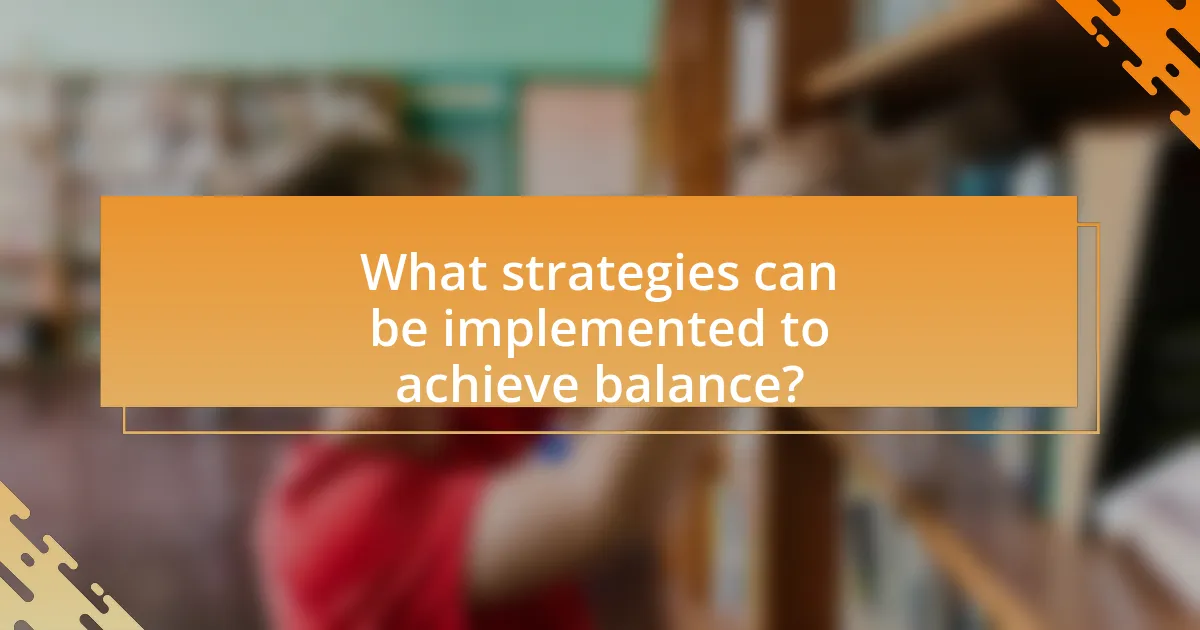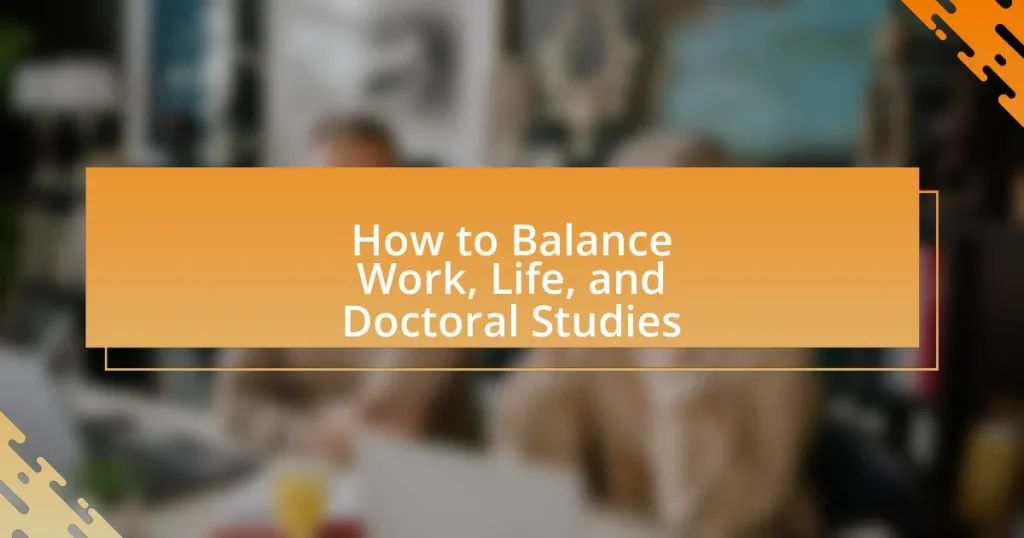The article focuses on the strategies for effectively balancing work, life, and doctoral studies. It highlights the importance of time management, setting boundaries, and prioritizing tasks to reduce stress and enhance productivity. Key challenges such as time constraints, emotional and mental health issues, and the impact of work-life balance on academic success are discussed. Additionally, the article outlines practical tips, support systems, and self-care practices that contribute to maintaining this balance, emphasizing the role of effective time management and mindfulness techniques in achieving overall well-being.

How can one effectively balance work, life, and doctoral studies?
To effectively balance work, life, and doctoral studies, one should prioritize time management and set clear boundaries. Research indicates that individuals who utilize structured schedules and prioritize tasks can significantly reduce stress and enhance productivity. For instance, a study published in the Journal of Educational Psychology found that students who employed time management strategies reported higher academic performance and lower anxiety levels. Additionally, establishing specific times for work, study, and personal activities helps maintain a healthy balance, ensuring that each area receives adequate attention without overwhelming the individual.
What are the key challenges faced in balancing these three areas?
The key challenges faced in balancing work, life, and doctoral studies include time management, stress management, and maintaining motivation. Time management is critical as doctoral studies often require significant time investment, which can conflict with work responsibilities and personal life commitments. Stress management is essential because juggling these areas can lead to burnout, affecting both academic performance and personal relationships. Maintaining motivation is also challenging, as the demands of work and life can detract from the focus needed for successful doctoral studies. Research indicates that 40% of doctoral students report high levels of stress, which underscores the importance of effective strategies to manage these challenges.
How do time constraints impact work-life balance during doctoral studies?
Time constraints significantly disrupt work-life balance during doctoral studies by limiting the time available for personal activities and relationships. Doctoral candidates often face rigorous deadlines for research, coursework, and teaching responsibilities, which can lead to increased stress and reduced time for family, friends, and self-care. Research indicates that 70% of doctoral students report experiencing high levels of stress due to time pressures, which negatively affects their mental health and overall well-being. This imbalance can result in burnout, decreased productivity, and a diminished academic experience, highlighting the critical need for effective time management strategies to mitigate these impacts.
What emotional and mental health challenges arise from juggling work, life, and studies?
Juggling work, life, and studies leads to significant emotional and mental health challenges, including stress, anxiety, and burnout. These challenges arise from the constant pressure to meet deadlines and fulfill responsibilities across multiple domains. Research indicates that individuals managing these competing demands often experience heightened levels of stress, which can result in anxiety disorders; a study published in the Journal of Occupational Health Psychology found that work-life conflict is a strong predictor of anxiety symptoms. Additionally, the lack of adequate time for self-care and relaxation contributes to burnout, characterized by emotional exhaustion and decreased motivation, as highlighted in a report by the World Health Organization. Thus, the interplay of work, life, and academic responsibilities creates a complex environment that can severely impact mental well-being.
Why is it important to find a balance between work, life, and doctoral studies?
Finding a balance between work, life, and doctoral studies is crucial for maintaining mental health and academic success. This balance helps prevent burnout, which can negatively impact both personal well-being and academic performance. Research indicates that individuals who manage their time effectively across these domains report higher levels of satisfaction and productivity. For instance, a study published in the Journal of Higher Education found that graduate students who prioritize work-life balance are more likely to complete their degrees on time and with better grades. Therefore, achieving this balance is essential for sustaining motivation and achieving long-term goals in both professional and academic settings.
How does balance contribute to academic success in doctoral programs?
Balance significantly contributes to academic success in doctoral programs by enhancing mental well-being and productivity. Maintaining a healthy equilibrium between academic responsibilities, personal life, and work commitments allows doctoral students to manage stress effectively, which is crucial for sustaining motivation and focus. Research indicates that students who prioritize balance report higher levels of satisfaction and lower rates of burnout, leading to improved academic performance. For instance, a study published in the Journal of Higher Education found that students who engaged in regular physical activity and social interactions alongside their studies achieved better grades and completed their programs more efficiently. This evidence underscores the importance of balance in fostering an environment conducive to academic success in doctoral programs.
What role does work-life balance play in personal well-being?
Work-life balance significantly enhances personal well-being by reducing stress and improving mental health. Research indicates that individuals who maintain a healthy work-life balance experience lower levels of anxiety and depression, leading to greater overall life satisfaction. A study published in the Journal of Occupational Health Psychology found that employees with a balanced approach to work and personal life reported higher levels of job satisfaction and lower burnout rates. This balance allows individuals to engage in fulfilling personal activities, fostering stronger relationships and a sense of purpose, which are critical components of well-being.

What strategies can be implemented to achieve balance?
To achieve balance among work, life, and doctoral studies, individuals can implement time management strategies, prioritize tasks, and establish boundaries. Effective time management involves creating a structured schedule that allocates specific time blocks for work, study, and personal activities, which can enhance productivity and reduce stress. Prioritizing tasks through techniques like the Eisenhower Matrix helps individuals focus on what is urgent and important, ensuring that critical responsibilities are addressed first. Establishing boundaries, such as setting specific work hours and communicating availability to colleagues and family, fosters a clear separation between professional and personal life, which is essential for maintaining mental well-being. These strategies are supported by research indicating that structured time management and clear boundaries significantly contribute to reduced stress and improved life satisfaction among graduate students.
How can effective time management improve balance?
Effective time management improves balance by allowing individuals to allocate their time efficiently across various responsibilities, such as work, personal life, and academic pursuits. By prioritizing tasks and setting clear deadlines, individuals can reduce stress and avoid the feeling of being overwhelmed, which often disrupts balance. Research indicates that effective time management techniques, such as the Eisenhower Matrix, help individuals distinguish between urgent and important tasks, leading to better decision-making and enhanced productivity. This structured approach enables individuals to dedicate appropriate time to each area of their lives, fostering a healthier work-life balance and supporting academic success.
What tools and techniques can aid in time management for doctoral students?
Effective time management for doctoral students can be enhanced through tools such as digital calendars, task management apps, and techniques like the Pomodoro Technique and time blocking. Digital calendars, like Google Calendar, allow students to schedule classes, meetings, and deadlines, providing a visual overview of their commitments. Task management apps, such as Trello or Todoist, help in organizing tasks by priority and deadlines, ensuring that students stay on track with their research and coursework. The Pomodoro Technique, which involves working in focused intervals followed by short breaks, can improve concentration and productivity. Time blocking, where students allocate specific time slots for different activities, helps in managing time effectively and reducing procrastination. These tools and techniques are supported by research indicating that structured time management strategies lead to improved academic performance and reduced stress among graduate students.
How can prioritization of tasks enhance productivity?
Prioritization of tasks enhances productivity by enabling individuals to focus on the most important and impactful activities first. This approach minimizes time spent on less critical tasks, allowing for more efficient use of resources and energy. Research indicates that prioritizing tasks can lead to a 25% increase in productivity, as individuals are able to allocate their time to high-value activities that align with their goals. By systematically addressing tasks based on urgency and importance, individuals can achieve better outcomes in both their professional and academic pursuits, ultimately leading to a more balanced work-life dynamic.
What support systems are beneficial for maintaining balance?
Support systems that are beneficial for maintaining balance include social support networks, time management tools, and mental health resources. Social support networks, such as family, friends, and academic peers, provide emotional encouragement and practical assistance, which are crucial for managing stress and maintaining motivation during doctoral studies. Time management tools, like planners and scheduling apps, help individuals prioritize tasks and allocate time effectively, reducing feelings of overwhelm. Mental health resources, including counseling services and stress management programs, offer strategies to cope with the pressures of balancing work, life, and academic responsibilities. Research indicates that individuals who utilize these support systems report higher levels of satisfaction and lower levels of stress, demonstrating their effectiveness in promoting balance.
How can family and friends contribute to a supportive environment?
Family and friends contribute to a supportive environment by providing emotional, practical, and social support. Emotional support includes listening, encouragement, and understanding, which can alleviate stress and enhance mental well-being. Practical support may involve assisting with daily tasks or responsibilities, allowing individuals to focus on their doctoral studies. Social support fosters a sense of belonging and reduces feelings of isolation, which is crucial during challenging academic periods. Research indicates that strong social networks can lead to improved academic performance and overall life satisfaction, highlighting the importance of family and friends in creating a nurturing atmosphere for balancing work, life, and doctoral studies.
What role do academic advisors and mentors play in achieving balance?
Academic advisors and mentors play a crucial role in achieving balance by providing guidance, support, and resources tailored to the unique challenges faced by doctoral students. They help students navigate academic requirements, manage time effectively, and set realistic goals, which are essential for maintaining a healthy work-life balance. Research indicates that students who engage with advisors and mentors report higher levels of satisfaction and lower stress, as these relationships foster a sense of community and accountability. For instance, a study published in the Journal of Higher Education found that mentorship significantly correlates with improved academic performance and personal well-being among graduate students.

What practical tips can help maintain balance in daily life?
To maintain balance in daily life, prioritize time management by creating a structured schedule that allocates specific time blocks for work, personal activities, and study. Research indicates that effective time management can enhance productivity and reduce stress, as shown in a study published in the Journal of Educational Psychology, which found that students who used structured schedules reported higher satisfaction and lower anxiety levels. Additionally, setting clear boundaries between work and personal time helps prevent burnout, as evidenced by findings from the American Psychological Association, which highlight the importance of work-life boundaries for mental well-being. Regularly practicing mindfulness or relaxation techniques can also contribute to emotional balance, supported by studies that demonstrate mindfulness reduces stress and improves focus.
How can setting boundaries improve work-life balance?
Setting boundaries can significantly improve work-life balance by clearly delineating personal and professional responsibilities. When individuals establish limits on work hours and availability, they create dedicated time for personal activities, reducing stress and preventing burnout. Research indicates that employees who set boundaries report higher job satisfaction and lower levels of anxiety, as they can focus on both work and personal life without overlap. For instance, a study published in the Journal of Occupational Health Psychology found that boundary management positively correlates with well-being, highlighting the importance of maintaining a separation between work and personal time.
What are effective ways to communicate boundaries to employers and family?
Effective ways to communicate boundaries to employers and family include being clear, direct, and assertive about your needs. For instance, when discussing work hours, explicitly state your availability and the importance of personal time for productivity and well-being. Research indicates that clear communication of boundaries can lead to improved relationships and reduced stress, as highlighted in a study published in the Journal of Occupational Health Psychology, which found that employees who set boundaries reported higher job satisfaction and lower burnout rates. Similarly, with family, expressing your limits regarding time and responsibilities fosters understanding and respect, ultimately enhancing familial relationships.
How can one create a dedicated study space to minimize distractions?
To create a dedicated study space that minimizes distractions, one should select a quiet location that is free from interruptions and clutter. This space should be equipped with essential study materials and technology, ensuring that everything needed is within reach to avoid unnecessary breaks. Research indicates that a well-organized environment can enhance focus and productivity, as demonstrated in a study by the University of Minnesota, which found that students in tidy spaces performed better academically. Additionally, establishing clear boundaries by communicating with others about study times can further reduce interruptions, reinforcing the importance of a dedicated study area.
What are some self-care practices that support balance?
Self-care practices that support balance include mindfulness meditation, regular physical exercise, and maintaining a structured daily routine. Mindfulness meditation has been shown to reduce stress and improve focus, which is crucial for managing the demands of work and doctoral studies. Research published in the journal “Psychological Science” indicates that mindfulness can enhance cognitive flexibility and emotional regulation. Regular physical exercise, such as aerobic activities, contributes to improved mental health and energy levels, as supported by studies from the American Psychological Association that link physical activity to reduced anxiety and depression. Additionally, maintaining a structured daily routine helps individuals allocate time effectively for work, study, and personal life, promoting a sense of control and balance.
How can regular exercise and healthy eating contribute to overall well-being?
Regular exercise and healthy eating significantly enhance overall well-being by improving physical health, mental clarity, and emotional stability. Engaging in regular physical activity, such as aerobic exercises, has been shown to reduce the risk of chronic diseases, including heart disease and diabetes, while also boosting mood through the release of endorphins. A balanced diet rich in fruits, vegetables, whole grains, and lean proteins provides essential nutrients that support bodily functions and cognitive performance. Research indicates that individuals who maintain a healthy lifestyle experience lower levels of stress and anxiety, which is crucial for managing the demands of work, life, and academic responsibilities. For instance, a study published in the Journal of Health Psychology found that individuals who exercise regularly report higher life satisfaction and lower levels of depression. Thus, the combination of exercise and nutrition plays a vital role in fostering a holistic sense of well-being.
What mindfulness techniques can help manage stress during doctoral studies?
Mindfulness techniques that can help manage stress during doctoral studies include meditation, deep breathing exercises, and mindful walking. Meditation allows students to focus their thoughts and reduce anxiety, with studies showing that regular practice can decrease stress levels significantly. Deep breathing exercises promote relaxation by activating the body’s relaxation response, which can lower heart rate and blood pressure. Mindful walking encourages awareness of the present moment, helping to clear the mind and improve focus. Research indicates that these techniques can enhance emotional regulation and resilience, making them effective tools for managing the unique stresses of doctoral studies.



